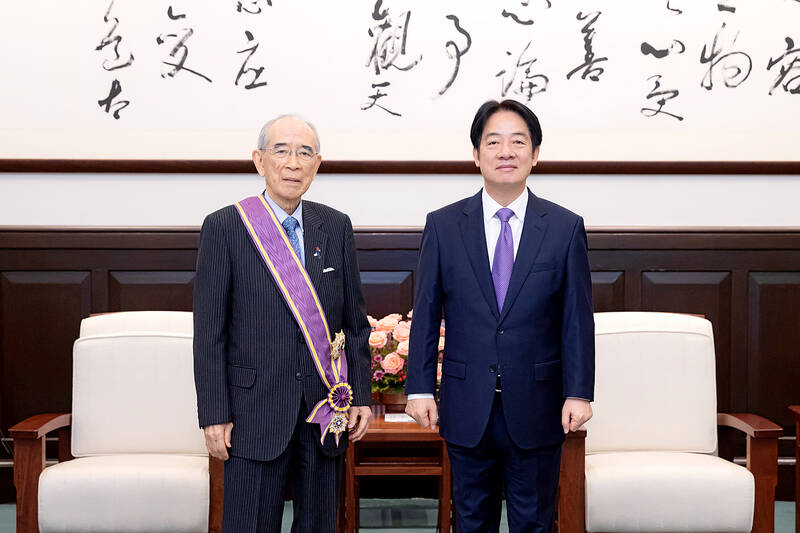President William Lai (賴清德) yesterday conferred a presidential award on Mitsuo Ohashi, former chair of the Japan-Taiwan Exchange Association (JTEA), in recognition of his contributions to Taiwan-Japan relations.
During a ceremony in Taipei, Lai presented the Order of the Brilliant Star with Grand Cordon to Ohashi, who led the JTEA for 14 years, praising him as “a model of Taiwan- Japan friendship,” according to a Presidential Office news release.
The president thanked Ohashi for his unwavering dedication to promoting bilateral ties, noting that during his tenure, Taipei and Tokyo had signed over 50 agreements on trade and economics, fisheries and taxation.

Photo courtesy of the Presidential Office via CNA
He also credited Ohashi’s efforts with helping institutionalize Taiwan-Japan ties, notably through the 2017 renaming of the JTEA and its Taiwanese counterpart, the Taiwan-Japan Relations Association, to include the word “Taiwan.”
Looking ahead, Lai expressed hope that Taiwan and Japan would further strengthen their relations by accelerating talks on an economic partnership agreement and collaborating in key sectors such as semiconductors, energy and artificial intelligence.
In his remarks, Ohashi said he is proud of the close ties between Taiwan and Japan, particularly in the midst of growing international geopolitical tensions, according to the news release.
Ohashi, who was on a short visit to Taiwan on Thursday and Friday, said he would continue to promote peace in his role as head of the Japan branch of the World Federalist Movement, an organization dedicated to advancing global cooperation and democratic governance.
Ohashi was succeeded by Shuzo Sumi, the former head of Tokio Marine Holdings, Inc., as the JTEA chair -- a primarily ceremonial role -- on June 20.
The JTEA is headquartered in Tokyo and has offices in Taipei and Kaohsiung. Its Taipei office functions as the de facto Japanese embassy in Taiwan, and its current representative is Kazuyuki Katayama.

A small number of Taiwanese this year lost their citizenship rights after traveling in China and obtaining a one-time Chinese passport to cross the border into Russia, a source said today. The people signed up through Chinese travel agencies for tours of neighboring Russia with companies claiming they could obtain Russian visas and fast-track border clearance, the source said on condition of anonymity. The travelers were actually issued one-time-use Chinese passports, they said. Taiwanese are prohibited from holding a Chinese passport or household registration. If found to have a Chinese ID, they may lose their resident status under Article 9-1

Taiwanese were praised for their composure after a video filmed by Taiwanese tourists capturing the moment a magnitude 7.5 earthquake struck Japan’s Aomori Prefecture went viral on social media. The video shows a hotel room shaking violently amid Monday’s quake, with objects falling to the ground. Two Taiwanese began filming with their mobile phones, while two others held the sides of a TV to prevent it from falling. When the shaking stopped, the pair calmly took down the TV and laid it flat on a tatami mat, the video shows. The video also captured the group talking about the safety of their companions bathing

PROBLEMATIC APP: Citing more than 1,000 fraud cases, the government is taking the app down for a year, but opposition voices are calling it censorship Chinese Nationalist Party (KMT) Chairwoman Cheng Li-wun (鄭麗文) yesterday decried a government plan to suspend access to Chinese social media platform Xiaohongshu (小紅書) for one year as censorship, while the Presidential Office backed the plan. The Ministry of the Interior on Thursday cited security risks and accusations that the Instagram-like app, known as Rednote in English, had figured in more than 1,700 fraud cases since last year. The company, which has about 3 million users in Taiwan, has not yet responded to requests for comment. “Many people online are already asking ‘How to climb over the firewall to access Xiaohongshu,’” Cheng posted on

A classified Pentagon-produced, multiyear assessment — the Overmatch brief — highlighted unreported Chinese capabilities to destroy US military assets and identified US supply chain choke points, painting a disturbing picture of waning US military might, a New York Times editorial published on Monday said. US Secretary of Defense Pete Hegseth’s comments in November last year that “we lose every time” in Pentagon-conducted war games pitting the US against China further highlighted the uncertainty about the US’ capability to intervene in the event of a Chinese invasion of Taiwan. “It shows the Pentagon’s overreliance on expensive, vulnerable weapons as adversaries field cheap, technologically